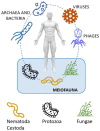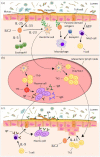How the gut parasitome affects human health
- PMID: 35509426
- PMCID: PMC9058362
- DOI: 10.1177/17562848221091524
How the gut parasitome affects human health
Abstract
The human gut microbiome (GM) is a complex ecosystem that includes numerous prokaryotic and eukaryotic inhabitants. The composition of GM can influence an array of host physiological functions including immune development. Accumulating evidence suggest that several members of non-bacterial microbiota, including protozoa and helminths, that were earlier considered as pathogens, could have a commensal or beneficial relationship with the host. Here we examine the most recent data from omics studies on prokaryota-meiofauna-host interaction as well as the impact of gut parasitome on gut bacterial ecology and its role as 'immunological driver' in health and disease to glimpse new therapeutic perspectives.
Keywords: big-data omics; human gut microbiome; meiofauna; prokaryota.
© The Author(s), 2022.
Conflict of interest statement
Conflict of interest statement: The authors declared no potential conflicts of interest with respect to the research, authorship, and/or publication of this article.
Figures


References
-
- Riaz Rajoka MS, Shi J, Mehwish HM, et al.. Interaction between diet composition and gut microbiota and its impact on gastrointestinal tract health. Food Sci Hum Well 2017; 6: 121–130.
-
- Salvucci E. The human-microbiome superorganism and its modulation to restore health. Int J Food Sci Nutr 2019; 70: 781–795. - PubMed
-
- Scanlan PD, Marchesi JR. Micro-eukaryotic diversity of the human distal gut microbiota: qualitative assessment using culture-dependent and -independent analysis of faeces. ISME J 2008; 2: 1183–1193. - PubMed
Publication types
LinkOut - more resources
Full Text Sources

